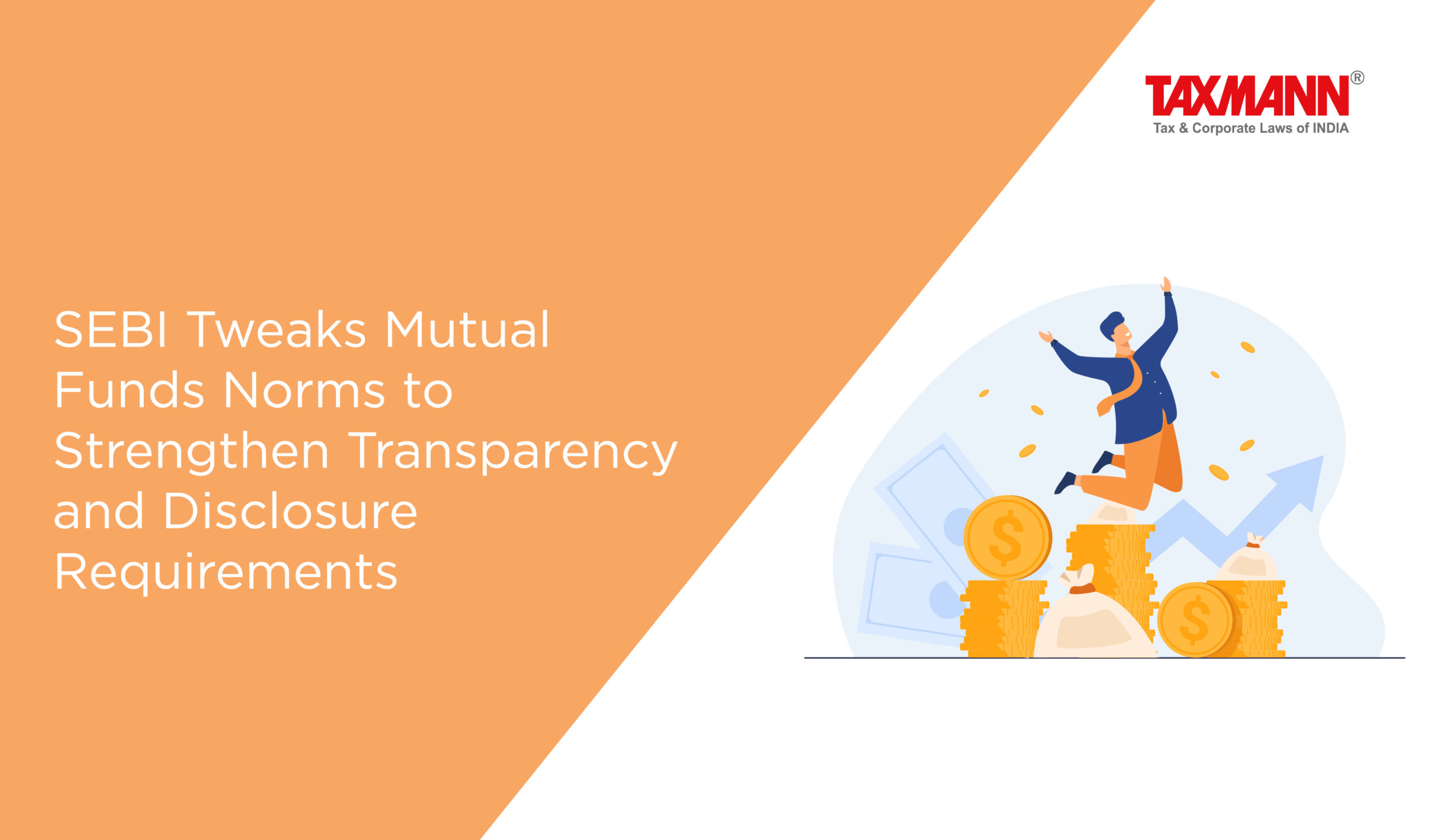SEBI Tweaks Mutual Funds Norms to Strengthen Transparency and Disclosure Requirements
- News|Blog|Company Law|
- 3 Min Read
- By Taxmann
- |
- Last Updated on 29 June, 2023

Notification No. SEBI/LAD-NRO/GN/2023/134, Dated 26.06.2023
The SEBI vide Notification No. SEBI/LAD-NRO/GN/2023/134, dated 26.06.2023 has introduced the amendments in the Securities and Exchange Board of India (Mutual Funds) Regulations, 1996. The amendment focuses on the definitions of “Liquid net worth” and “Net Asset Value”, introduction of a new meeting requirement for the BODs of trustee companies and asset management companies including their committees, etc.
Some of the key highlights of the amendment are as follows:
1. SEBI introduces the definition of “Liquid net worth” and “Net Asset Value” [Newly introduced Regulation 2(na) & 2(qa)]
With the present amendment, the SEBI has introduced Regulation 2(na) and 2(qa) of the SEBI (Mutual Funds) Regulations, 1996, which now define “Liquid net value” and “Net Asset Value” respectively.
2. Revised Eligibility Criteria for Sponsors; redefines sound track record [Regulation 7]
As per the Regulation 7, the sponsor should have a sound track record and general reputation of fairness and integrity in all business transactions, is one of the primary criteria for eligibility.
Now, in addition to the existing conditions, the sponsor shall now have net profit after providing for depreciation, interest and tax in each of the immediately preceding five years, instead of three out of the immediately preceding five years, including the fifth year.
3. SEBI notifies the new eligibility criteria if the sponsor doesn’t satisfy the ‘sound track record’ criteria [Regulation 7]
Now, if the requirements of the “sound track record” are not satisfied, the sponsor shall:
Adequately capitalize the asset management company such that the net worth of the asset management company is not less than rupees one hundred fifty crore; and
Ensure that the initial shareholding equivalent to capital contributed to the asset management company to the extent of not less than rupees one hundred fifty crore is locked-in for a period of five years; and
Appoint experienced personnel in asset management company such that the total combined experience of Chief Executive Officer, Chief Operating Officer, Chief Risk Officer, Chief Compliance Officer and Chief Investment Officer should be at least thirty years; and
Ensure that in case of acquisition of existing asset management company, the sponsor shall have minimum positive liquid net worth equal to incremental capitalization required to ensure minimum capitalization of the asset management company and the positive liquid net worth of the sponsor or the funds tied up by the sponsor are to the extent of aggregate par value or market value of the shares proposed to be acquired, whichever is higher; and
Ensure that in case of acquisition of stake in an existing asset management company, the shareholding equivalent to at least rupees one hundred fifty crore shall be locked in for five years; and
Ensure that other conditions in this regard as may be specified by the Board from time to time are adhered to.
4. Sponsors are now permitted to disassociate from the AMCs and the mutual fund [Newly introduced Regulation 7B]
With the present amendment, regulation 7B has been introduced. Now, the sponsor is permitted to disassociate from the asset management company and the mutual fund subject to certain conditions.
In the event of the sponsor disassociating itself from the asset management company and the mutual fund, the asset management company of the existing mutual fund may act as sponsor of the same mutual fund.
5. Chairperson of the board of directors of trustee company shall be an independent director: SEBI [Regulation 16(7)]
A new regulation 16(7) has been introduced. Now, in case a company is appointed as the trustee of a mutual fund, the Chairperson of the board of directors of that trustee company shall be an independent director.
Click Here To Read The Full Notification
Disclaimer: The content/information published on the website is only for general information of the user and shall not be construed as legal advice. While the Taxmann has exercised reasonable efforts to ensure the veracity of information/content published, Taxmann shall be under no liability in any manner whatsoever for incorrect information, if any.

Taxmann Publications has a dedicated in-house Research & Editorial Team. This team consists of a team of Chartered Accountants, Company Secretaries, and Lawyers. This team works under the guidance and supervision of editor-in-chief Mr Rakesh Bhargava.
The Research and Editorial Team is responsible for developing reliable and accurate content for the readers. The team follows the six-sigma approach to achieve the benchmark of zero error in its publications and research platforms. The team ensures that the following publication guidelines are thoroughly followed while developing the content:
- The statutory material is obtained only from the authorized and reliable sources
- All the latest developments in the judicial and legislative fields are covered
- Prepare the analytical write-ups on current, controversial, and important issues to help the readers to understand the concept and its implications
- Every content published by Taxmann is complete, accurate and lucid
- All evidence-based statements are supported with proper reference to Section, Circular No., Notification No. or citations
- The golden rules of grammar, style and consistency are thoroughly followed
- Font and size that’s easy to read and remain consistent across all imprint and digital publications are applied



 CA | CS | CMA
CA | CS | CMA
